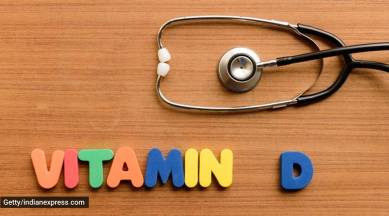📣 For more lifestyle news, click here to join our WhatsApp Channel and also follow us on Instagram
Vitamin D deficiency is ‘rampant and extremely prevalent’; find out if you are more at risk than others
“Vitamin D is primarily produced in the skin in response to sunlight, but it is also absorbed from food eaten as part of a healthy balanced diet (about 10% of vitamin D is absorbed this way),” says Dr Bikky Chaurasia, Consultant, Internal Medicine, Kokilaben Dhirubhai Ambani Hospital

Vitamin D is a water-soluble vitamin that helps the body to absorb and retain calcium and phosphorus, strengthens the immune system, boosts mood, and decreases the chances of heart disease among other things. But vitamin D deficiency is becoming rampant in India, with “the prevalence of deficiency ranging from 40% to 99%, with most of the studies reporting a prevalence of 80%–90%. It was prevalent in all age groups and high-risk groups alike,” according to a study published by the National Center for Biotechnology Information.
“Vitamin D is actually a hormone rather than a vitamin. It is crucial for far more important functions than just strength for our bones. Deficiencies are rampant and extremely prevalent but some are more at risk than others,” Pooja Makhija, a celebrity nutritionist, said on Instagram as she shared a list of five groups of people who are more likely to suffer from vitamin D deficiency than others; they are:
monthly limit of free stories.
with an Express account.
1. If you are overweight or obese. It is probably because of volumetric dilution into greater amounts of serum as well as fat as well as muscle.
2. If you have darker skin. The darker the skin the lesser the synthesis of vitamin D because melanin interferes with the absorption and synthesis of vitamin D.
3. If you are taking lipid-lowering drugs such as statins, which also lower cholesterol. You require cholesterol for the endogenous production of vitamin D. So if you are taking medicines to lower cholesterol, it will lead to increased vitamin D deficiency.
4. If you had bariatric surgery. There is fat malabsorption, so gastric bypass can lead to an increased vitamin D deficiency
5. If you have a digestive issue like IBS or SIBO (Small intestinal bacterial overgrowth). Again, these involve fat malabsorption, therefore, you would have floating stools that could be one of the reasons why vitamin D, which is a fat-soluble vitamin, isn’t able to get absorbed.
Dr Shobha Subramanian Itolikar, Consultant-Internal Medicine, Fortis Hospital Mulund, told indianexpress.com that apart from the above-listed people, some others are also at an elevated risk of developing vitamin D deficiency. They are:
1. Vegan and vegetarians: The natural source of vitamin D are animal products like salmon, tuna, egg yolk or fortified dairy products, therefore vegetarians can suffer from vitamin D deficiency
2. Geographical location: People outside of latitudes 37 degrees north and 37 degrees south have inadequate UV- B exposure
3. Office goers: People working 9 to 5 are largely indoors when the sun is out, and hence don’t get enough exposure
What are the signs of vitamin D deficiency?
Dr Bikky Chaurasia, Consultant, Internal Medicine, Kokilaben Dhirubhai Ambani Hospital, Mumbai listed muscle aches, body ache, bone pain, fatigue, depression, hair loss as some signs of vitamin D deficiency. “The deficiency further leads to loss of bone density as it causes osteoporosis and fractures. In adults, severe deficiency causes osteomalacia, and in children it causes rickets,” he added.
Vitamin D deficiency increases chances of depression
According to Dr Babina NM, Chief Medical Officer, Jindal Naturecure Institute, “depression has been associated with vitamin D insufficiency, particularly in elderly persons. Compared to those with higher amounts of vitamin D in their blood, those with low levels had a more than twofold increased risk of being diagnosed with depression”.
Natural sources of vitamin D
“Vitamin D is primarily produced in the skin in response to sunlight, but it is also absorbed from food eaten as part of a healthy balanced diet (about 10% of vitamin D is absorbed this way),” said Dr Chaurasia, adding that it is advised to take early morning sunlight for at least 15 minutes minimum and maintain a healthy diet and lifestyle with vitamin D rich foods. “One can also keep a balanced diet and increase the intake of dairy products, cereals, egg yolk, beef, fish etc. In case of persistently low vitamin D, consult your physician immediately,” he suggested.
Dr Babina NM added that spinach, kale, okra, collards, soybeans, white beans are good sources for vitamin D. However, Dr Itolikar stressed that dietary changes alone is insufficient to compensate for it. “Our daily requirement is 800-1000 IU/ day. You need to consult your doctor for advice regarding supplements as each individual’s requirement may vary, and start taking them”.
📣 For more lifestyle news, follow us on Instagram | Twitter | Facebook and don’t miss out on the latest updates!
📣 For more lifestyle news, click here to join our WhatsApp Channel and also follow us on Instagram